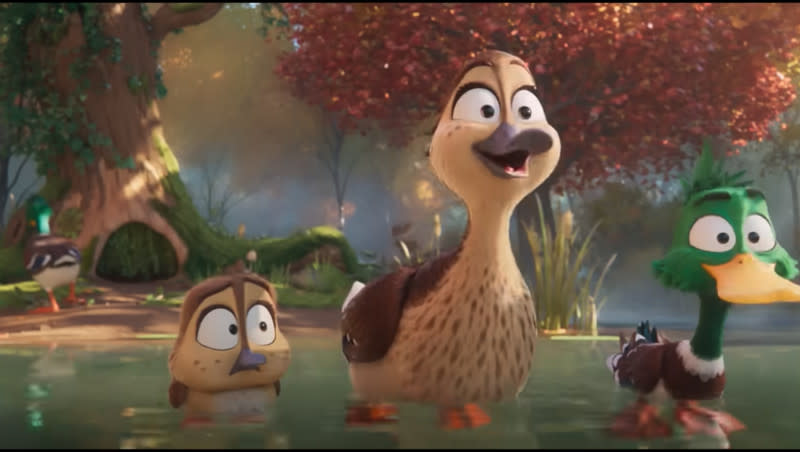Perspective: What ‘Migration’ says about parents, children and risk

“What sort of father would I be if I put my young fowl in harm’s way for no reason except a chance at a Caribbean vacation?” So asks Mack, the mallard who stars in the new animated film “Migration.”
The movie begins when Mack’s wife, Pam, sees a flock of birds flying south to Jamaica and wants their family to go along. Her husband, though, can’t imagine putting their children at risk when they have a perfectly happy and safe home on a New England pond. Throughout the movie, Mack and Pam go back and forth about how much risk is too much for their ducklings. It’s a fascinating premise that resonates on many levels.
Weighing risk for kids often pits one family against another, or a family against the school, or a family against the rest of their community. Parent listservs are filled with arguments about whether a parent who left kids alone is being irresponsible or whether a school administration is exercising enough supervision. But the truth is that most of these conflicts— and the hardest ones to navigate — are actually within families, like the mallard couple in “Migration.”
It is stereotypically the mother who is more protective of the children and the father who wants them to take more risks. But no matter who is playing which role, parents will reasonably disagree about whether kids are old enough to cross the street alone or babysit a younger sibling or use the stove.
Many of these are judgment calls — which include assessing the maturity of the individual child — and reasonable people might disagree. Neither Pam nor Mack wants their children to be in danger and neither one wants their children to grow up without learning basic adult skills. But when a child should be given independence — and how much — can strain even the most resilient marriages.
When I first read the story of 6-year-old Casper Ramos, who was supposed to fly unaccompanied from Philadelphia to Fort Myers, Florida, but ended up instead on a flight to Orlando, I immediately wondered about the conversation his parents might have had before deciding to send him to visit his grandmother by himself. Maybe his father thought he would be fine — there are flight attendants who would be assigned to watch him the whole time — and his mother wondered whether you could really trust airline staff with such a big responsibility. It’s a dangerous world out there. And no one wants to be the parent who is wrong.
Thankfully, nothing bad happened to Carlos. He ended up four hours away from the grandmother who was supposed to pick him up, but he was unscathed. Still, no one would want to be the parent who said this journey was a good idea.
The story of “Migration” is interesting because the parents are also arguing over whether the whole family should take a risk. Should you up and move your family to another part of the country or another part of the world? Exposing your children to other cultures and experiences can seem like a great idea to some parents. But others don’t want to risk pulling their children off of the path they know and that is well-trodden by their friends and neighbors.
A new memoir, “Wavewalker” by Suzanne Heywood, chronicles how the author’s father decided to follow in the footsteps of Captain James Cook and sail around the world. Heywood was only 7 in 1976 when her father sold all their worldly possessions, bought a boat, and set sail with her mother and her younger brother as well.
The journey is treacherous, to say the least. The waves nearly turn over the boat. They lose the compass. They are chased out of ports by angry port masters. And their mother spends much of the time at sea ill and bedridden. Heywood and her brother turn into deckhands. Their schooling is haphazard at best. It seems as if the whole scheme is cooked up by Heywood’s father, but it’s hard to see how things would have worked if their mother disagreed. They sailed for 10 years, a whole childhood lost to her father’s whims.
Things turn out better in “Migration,” of course. The children learn the skills they will need as they grow up. The parents learn to trust their children a little more. And the children see their parents in a new, more admirable light.
But perhaps most interestingly, the relationship between Pam and Mack evolves. I can’t recall another animated movie with such a complex portrayal of marriage — Pam is clearly a little tired of her husband’s homebody tendencies when the movie begins. Negotiating risk for their family is not easy, but the process forces them both to grow and rediscover their love for each other. It’s not a bad message for a children’s movie — or any movie at all.
Naomi Schaefer Riley is a senior fellow at the American Enterprise Institute, a Deseret News contributor and the author of “No Way to Treat a Child: How the Foster Care System, Family Courts, and Racial Activists Are Wrecking Young Lives,” among other books.

